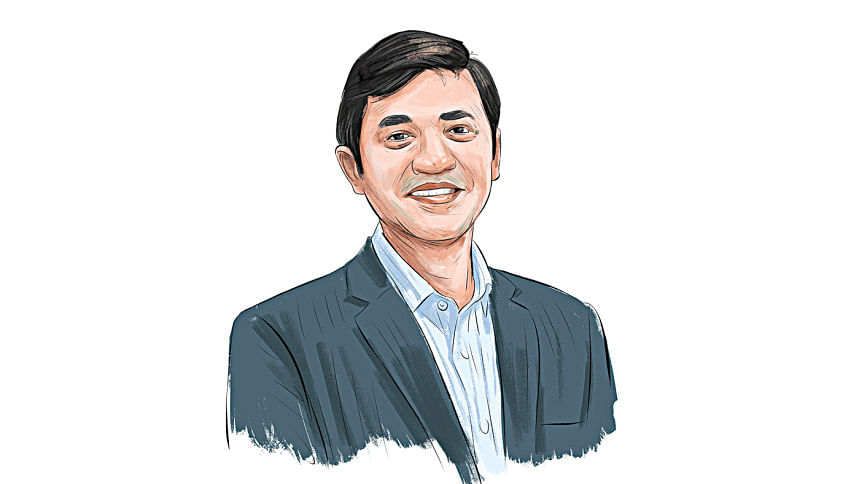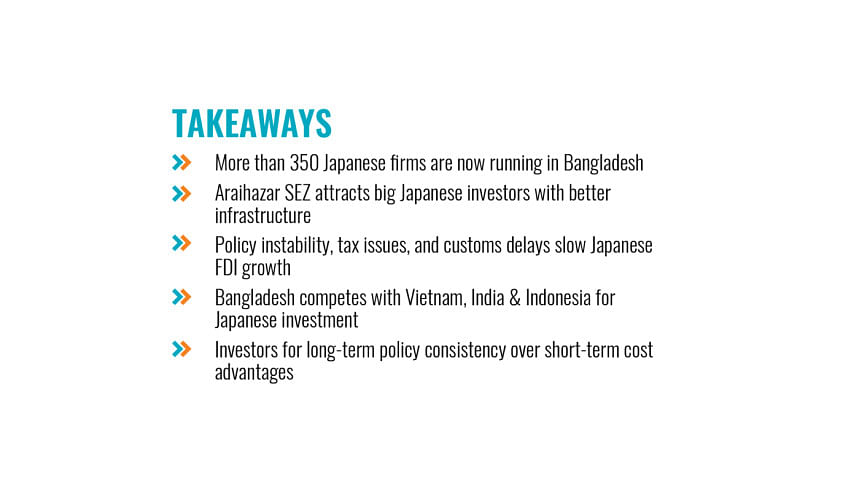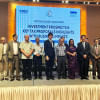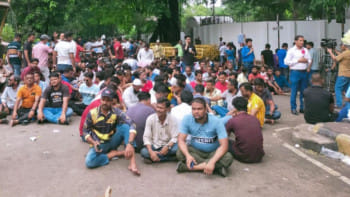Japanese FDI rising, still there’s room to attract more

Japanese investment in Bangladesh has grown steadily over the past decade. But with clearer policies, improved infrastructure and a more predictable regulatory environment, there is room to attract much more.
These were the key observations shared by Tareq Rafi Bhuiyan Jun, president of the Japan-Bangladesh Chamber of Commerce and Industry (JBCCI).
"There are now over 350 Japanese companies running in Bangladesh, which is nearly three times more than a decade ago," Jun said in a recent interview with The Daily Star.
"That is a positive sign, but it is not where it could be. Many Japanese companies are still in a wait-and-see mode because of recurring uncertainties in policy and regulation."
While Japanese firms are interested in Bangladesh's prospects, especially in light engineering, logistics, IT services, infrastructure, human resources and manufacturing, they are also wary of the country's investment climate.
"We are not just competing with ourselves," Jun said. "We are competing with countries like Vietnam, Indonesia, and India. Investors compare policies, timelines, and ease of doing business. In too many of these areas, Bangladesh still lags."

One promising development Jun pointed to is the Bangladesh Special Economic Zone in Araihazar area of Narayanganj, a joint venture between Japan's Sumitomo Corporation and the Bangladesh Economic Zones Authority (Beza).
Several Japanese and international firms, including Singer, Art Nature, Lion Corporation and IRIS, have already begun setting up operations there.
"The infrastructure of the zone at Araihazar is truly world-class," Jun said. "It gives Japanese investors confidence that things can be done right here. But one zone is not enough. The pace of such developments must be accelerated and backed by consistent policies."
However, even where infrastructure exists, policy instability often undercuts progress. According to Jun, predictability now matters more to investors than low costs.
"Cost matters, but stability matters more," he said. "Sudden changes to tax laws, customs rules, or investment incentives cause hesitation. Investors plan for decades, not for five-year electoral terms."
Japanese firms often cite political uncertainty, unclear policies, complex tax structures and customs delays as key concerns. These not only increase costs but also create unnecessary confusion for companies operating under tight schedules.
"Many of our member companies have experienced long delays at ports, inconsistent duty assessments, and overlapping regulations," Jun said. "For firms importing high-precision machinery or perishable components, this can be devastating."
The Japan-Bangladesh chamber president called for urgent reform of customs procedures, including the digitisation of clearance systems and a reduction in the discretionary powers of officials at checkpoints.
He welcomed government initiatives such as the Bangladesh Single Window (BSW) and the Authorised Economic Operator (AEO) schemes, describing them as steps in the right direction.
Jun also raised concern over the disadvantages faced by companies that follow the rules.
"Japanese firms follow global standards in labour, safety, import procedures and environmental compliance. But when they compete with local companies that cut corners on wages, taxes, or workplace safety, it creates an uneven playing field," he said.
He urged the government to reward ethical business conduct by offering incentives and support to both foreign and local firms that play by the rules.
"If compliance becomes a burden, investors will go elsewhere. We must align our systems so that the most responsible companies are also the most competitive."
Jun believes Bangladesh can strengthen its partnership with Japan by investing in its people. With Japan's ageing population, the demand for skilled foreign workers is rising and Bangladesh has the demographic advantage.
"If we can align our vocational and technical training systems to Japanese standards, our youth can find employment both at home and in Japan," he said.
Jun also pointed to the growing significance of the IT sector in Japan-Bangladesh ties.
"There is high demand for software development, business process outsourcing, and engineering services. But to meet this demand, we need collaboration between academia and industry, better training and greater exposure to global best practices."
To attract targeted Japanese investment, Jun said Bangladesh should develop sector-specific investment roadmaps.
"Each sector has its own requirements," he commented. "Whether it is infrastructure for logistics, power stability for manufacturing, or certifications for IT, these need to be mapped out clearly. Investors need visibility."
He also added that public-private consultation must be institutionalised and continuous, citing the Japan-Bangladesh Public-Private Economic Dialogue (PPED) as a platform that identifies and resolves key issues faced by investors.
"Happy investors work as ambassadors to attract further FDI," he added.
"Dialogue must not be ceremonial. It must feed directly into policy decisions, and its outcomes should be measurable."
Several major Japanese-backed infrastructure projects are already under way, including the Matarbari Deep Sea Port, the Dhaka Metro Rail, and the third terminal at Hazrat Shahjalal International Airport.
Jun believes these could be transformative, if completed on schedule.
"These are game changers," he said. "They will reduce logistics costs, boost efficiency, and make the country more attractive to investors."
Jun expressed optimism about the upcoming visit to Tokyo by Chief Adviser Professor Muhammad Yunus, calling it an opportunity to reset and deepen bilateral investment ties.
"This visit can demonstrate that Bangladesh is serious about long-term partnerships. But we must ensure deliverables, such as investment pledges, new agreements or knowledge-transfer initiatives."
He also praised the interim government's efforts to engage with all political parties, saying it had sent a reassuring message to foreign investors.
"Japanese investors want to see unity and continuity. Political alignment on economic goals builds long-term confidence."
"The next five years are make-or-break. If we make our systems more efficient, commit to policy stability, and deliver infrastructure on time, Japanese FDI will not just grow, it will multiply."
"But we cannot take this window for granted," he added. "Vietnam, Thailand, India, they are moving fast. If Bangladesh wants to compete, we must act now."

 For all latest news, follow The Daily Star's Google News channel.
For all latest news, follow The Daily Star's Google News channel. 








Comments